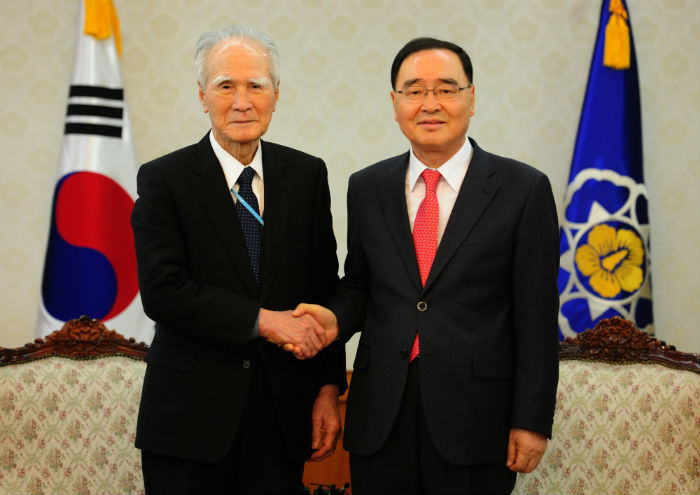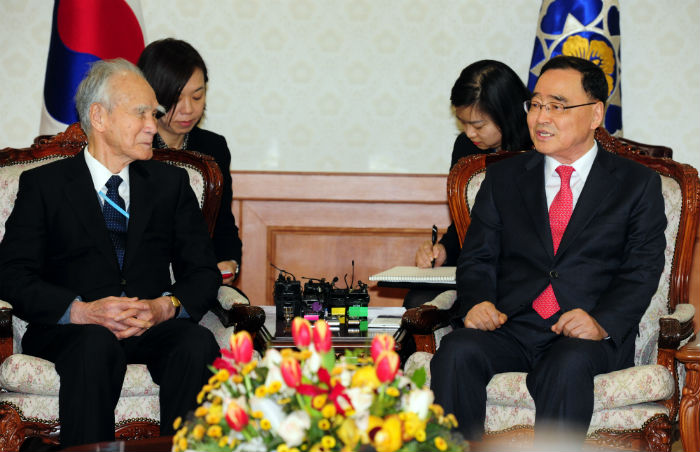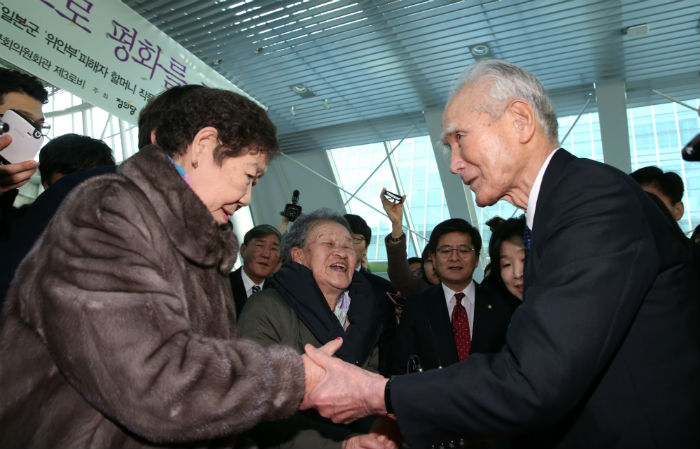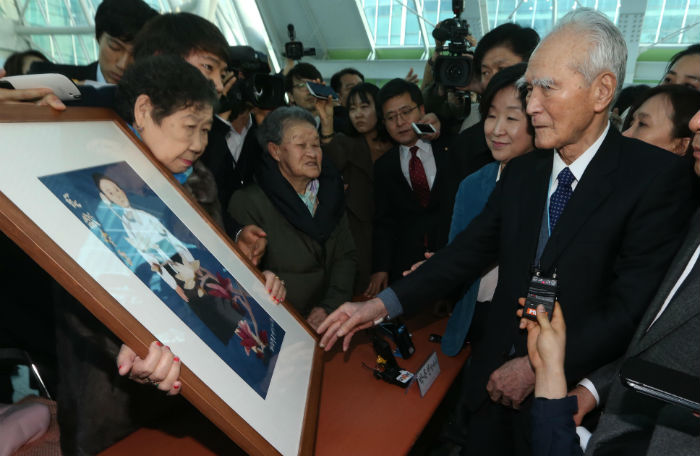Prime Minister Chung Hongwon met with former Japanese Prime Minister Tomiichi Murayama on February 13 in Seoul. Prime Minister Chung and the former Japanese leader agreed that a trust-based trilateral relationship between Korea, China and Japan is the foundation for peace and prosperity in Northeast Asia.
Prime Minister Chung said that Murayama’s visit to Korea holds great significance, considering the worsened bilateral relations between Seoul and Tokyo. He said this is particularly true because of recent thoughtless words from some Japanese leaders who are trying to turn back the wheel of history, back to over a century ago. Chung highly valued Murayama for his proper understanding of history and for his meeting with some of the surviving victims who had been abducted by the Japanese soldiers and forced into sexual slavery during the Second World War.
Prime Minister Chung said that the Korean people remember the Murayama Statement he made in 1995 while prime minister in which Japan made an honest and accurate apology for its invasion and unfortunate historical acts. He pointed out that recent thoughtless words from some Japanese high-ranking officials have, “thrown the Korean people into chaos,” and have worsened bilateral ties.
“A proper understanding of history is needed to solve past issues. This can then lead to future-looking bilateral relations,” said Chung. He urged the former Japanese leader to make efforts so that incumbent Japanese high-profile officials can make changes in their attitude.


Former Prime Minister Murayama acknowledged that Seoul-Tokyo relations are going through difficult times due to these misunderstandings. Murayama hoped that such undesirable relations can recover in the near future. He emphasized that the Murayama Statement was a decision of the Japanese government, not a personal one. He asked Chung to focus on the fact that the Abe Administration has also said it will adhere to the Murayama Statement.
Chung and Murayama shared the common view that repairing the past, based on a proper understanding of history, is key to moving forward relations between the two countries. They also agreed that a trust-based trilateral relationship between Korea, China and Japan would serve as the foundation for peace and prosperity across the whole Northeast Asian region.


The former Japanese prime minister also gave a special lecture at the National Assembly in Seoul where he criticized the way in which the issue of forced sexual slavery is remembered. “Japan committed indescribable wrongdoing by violating the human dignity of many women. Japan needs to solve the issue,” he said. Mentioning that many of the survivors of sexual slavery are getting old in age, he urged the two governments to quickly solve the issue.
In regard to the Murayama Statement, he said, “There is a national consensus [in Japan] that Japan needs to abide by that statement.” He met the surviving victims and offered them some consolation during a visit to their organization’s art exhibition on February 11.
By Yoon Sojung
Korea.net Staff Writer
arete@korea.kr
Prime Minister Chung said that Murayama’s visit to Korea holds great significance, considering the worsened bilateral relations between Seoul and Tokyo. He said this is particularly true because of recent thoughtless words from some Japanese leaders who are trying to turn back the wheel of history, back to over a century ago. Chung highly valued Murayama for his proper understanding of history and for his meeting with some of the surviving victims who had been abducted by the Japanese soldiers and forced into sexual slavery during the Second World War.
Prime Minister Chung said that the Korean people remember the Murayama Statement he made in 1995 while prime minister in which Japan made an honest and accurate apology for its invasion and unfortunate historical acts. He pointed out that recent thoughtless words from some Japanese high-ranking officials have, “thrown the Korean people into chaos,” and have worsened bilateral ties.
“A proper understanding of history is needed to solve past issues. This can then lead to future-looking bilateral relations,” said Chung. He urged the former Japanese leader to make efforts so that incumbent Japanese high-profile officials can make changes in their attitude.


Prime Minister Chung Hongwon (right) meets with former Japanese Prime Minister Tomiichi Murayama on February 13 in Seoul. (photos courtesy of the Ministry of Culture, Sports and Tourism)
Former Prime Minister Murayama acknowledged that Seoul-Tokyo relations are going through difficult times due to these misunderstandings. Murayama hoped that such undesirable relations can recover in the near future. He emphasized that the Murayama Statement was a decision of the Japanese government, not a personal one. He asked Chung to focus on the fact that the Abe Administration has also said it will adhere to the Murayama Statement.
Chung and Murayama shared the common view that repairing the past, based on a proper understanding of history, is key to moving forward relations between the two countries. They also agreed that a trust-based trilateral relationship between Korea, China and Japan would serve as the foundation for peace and prosperity across the whole Northeast Asian region.

Former Japanese Prime Minister Tomiichi Murayama (right) meets with surviving victims who were abducted by the Japanese military and forced into sexual slavery during the Second World War, in Seoul on February 13. (photo: Yonhap News)

Former Japanese Prime Minister Tomiichi Murayama (right) is offered a painting drawn by one of the victims who was abducted by the Japanese military and forced into sexual slavery during the Second World War, in Seoul on February 13. (photo: Yonhap News)
The former Japanese prime minister also gave a special lecture at the National Assembly in Seoul where he criticized the way in which the issue of forced sexual slavery is remembered. “Japan committed indescribable wrongdoing by violating the human dignity of many women. Japan needs to solve the issue,” he said. Mentioning that many of the survivors of sexual slavery are getting old in age, he urged the two governments to quickly solve the issue.
In regard to the Murayama Statement, he said, “There is a national consensus [in Japan] that Japan needs to abide by that statement.” He met the surviving victims and offered them some consolation during a visit to their organization’s art exhibition on February 11.
By Yoon Sojung
Korea.net Staff Writer
arete@korea.kr